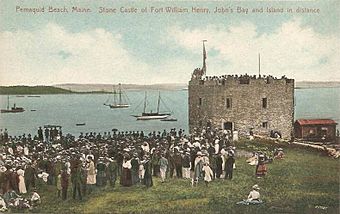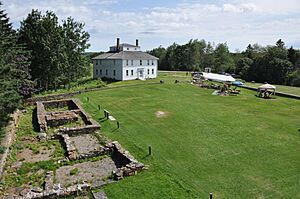Fort William Henry (Maine) facts for kids
|
Fort William Henry
|
|
|
U.S. National Historic Landmark District
Contributing Property |
|

A replica of Fort William Henry, built in 1908.
|
|
| Nearest city | New Harbor, Maine |
|---|---|
| Area | 1 acre (0.40 ha) |
| Built | 1692 |
| Part of | Pemaquid Archeological Site (ID69000022) |
| NRHP reference No. | 69000021 |
Quick facts for kids Significant dates |
|
| Added to NRHP | December 1, 1969 |
| Designated NHLDCP | April 12, 1993 |
Fort William Henry is a historic fort located in the village of New Harbor, Maine. When it was first built, it was the largest fort in all of New England. The original fort was built in 1692 but was destroyed just four years later by soldiers from New France (the French colonies in North America).
Today, a replica of the fort, built in 1908, stands in its place. It is now a museum where you can learn about the fort's exciting history. The fort is part of the Colonial Pemaquid State Historic Site. This site also has a museum with amazing artifacts dug up from the ground, like old musket balls, coins, and pottery from the 1600s and 1700s.
Contents
A History of Forts at Pemaquid
The site of Fort William Henry was so important that several forts were built there over many years.
Early Forts on the Site
The very first fort was a small trading post built in 1630 called Abraham Shurte's Fort. It was protected by a tall wooden fence called a palisade. Unfortunately, it was burned down by pirates only a few years later.
After that, a new fort called Fort Pemaquid was built. It stood from 1633 until 1676, when it was destroyed during a major conflict known as King Philip's War.
Fort Charles
The third fort built on the site was Fort Charles, which was built in 1677. It was named after the king of England at the time. This fort was captured and burned down in 1689 during another conflict called King William's War. A man named John Gyles, who was taken captive during the attack, later wrote about seeing the fort burn. He described it as a "terrible blast" and a "melancholy sight."
To get control of the area back, the English decided to build a much bigger and stronger fort.
The Great Stone Fort: Fort William Henry
In 1692, during King William's War, the English built Fort William Henry. It was designed to protect the northern border of New England from the French and their Native American allies in Acadia. The fort was a massive project and cost a lot of money to build.
The fort was made of stone, with walls that were 10 to 22 feet high. It had a huge stone tower, called a bastion, that was 29 feet tall. Inside, the fort was armed with 20 cannons and had 60 soldiers to defend it.
Despite its strength, the fort was attacked by a large force of French and Native American soldiers in 1696. This event is known as the Siege of Pemaquid (1696). The English soldiers were outnumbered and had to surrender. The fort was destroyed, and the English had to leave the area for a while.
Fort Frederick: The Final Fort
Years later, after another conflict called Father Rale's War, the fort was rebuilt between 1729 and 1730. This new fort was named Fort Frederick, in honor of the Prince of Wales.
Fort Frederick was attacked twice during King George's War in 1747, but the soldiers successfully defended it. The fort was finally taken down in 1759, during the French and Indian War.
During the Revolutionary War, the townspeople dismantled the fort's remains. They did this to stop it from being used by the British army.
The Fort Today
In 1902, the state of Maine bought the land where the forts once stood. In 1908, a historian guided the rebuilding of the stone tower of Fort William Henry, using many of the original stones. This replica is what visitors see today.
The fort was added to the National Register of Historic Places in 1969. In 1993, the entire area, including the fort and the old village ruins, was named a National Historic Landmark District. It is a special place where people can learn about America's colonial past.
See also
 | Charles R. Drew |
 | Benjamin Banneker |
 | Jane C. Wright |
 | Roger Arliner Young |




